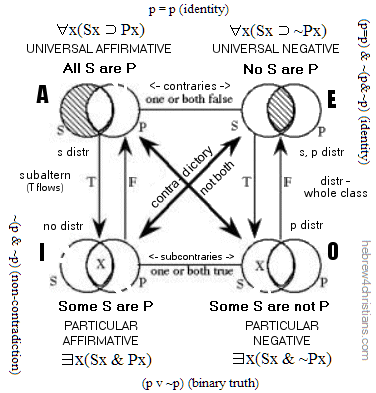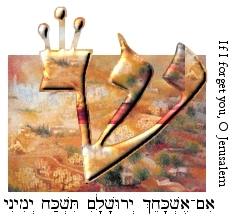|
We often feel quite alone with our faith, chaverim. Perhaps this is because Christianity (and Judaism before it) is a confessional faith, that is, there is cognitive (and volitional) content that, once embraced, sets up an endless array of contrary truth claims.
For example, when we affirm that the world around us is the "handiwork" (i.e., conscious design) of a single, all-powerful, all-knowing, all-loving, morally perfect, and spiritual Agency to whom we are directly responsible, then (among other things) our affirmation excludes the faith commitments of materialism (i.e., atheism/agnosticism), animism (and occultism), polytheism, deism, finite godism, dualism, pantheism, absolute monism, romantic humanism, absurdism, "Oprah Winfreyism," and so on. In other words, a well-defined faith confession creates an immediate tension with the multitude of differing visions/interpretations of reality (i.e., faiths).
 |
The mantra of today's self-stultifying politically correct world is, "Everyone is special and has a unique vision," thereby relegating all truth claims into the same homogenous class. This is a cardinal dogma in today's public schools... But if "everyone is special" then no one is special; if everyone has "the truth," then no one does. Note the insidious appeal to "consensus-based humanism" implied in the doctrine of today's insipid political correctness. In light of this, the confession of Yeshua (Jesus) is the actuation of collision. Faith both affirms and negates at the same time. Like falling in love with someone, the cost of passionately believing that Yeshua (alone) is the "way and the truth and the life" comes at the expense of other faith possibilities -- and thereby incurs the risk of offense (Rom. 9:33, 1 Pet. 2:7-8; Gal. 5:11, Matt. 24:8-11; etc.).
Does this make Christianity intolerant then? Not unless you are a hypocrite. All faith expressions - including skepticism, universalism, or "politically correct" humanism - are exclusivistic commitments to whatever the believer embraces as his or her "ground of ultimate concern." Each person has their own "narrow gate" -- though this gate does not necessarily lead to life in God.... Jesus taught that the "narrow gateway of life" (ū®ų╝ūüųĘūóųĘū© ūÉųČū£ųŠūöųĘūŚųĘūÖų╝ų┤ūÖūØ) is found by the few (Matt. 7:13-14), and this doubtlessly was said to reprove the mob mentality that regards "tolerance" as the greatest of all virtues and fanaticism as the greatest of all evils. There is safety in numbers, the mob reasons, and the life of genuine conviction makes you an outcast of the group, since it exposes the "groupthink" and its inevitable moral evasions.... Public enemy number one is the person of real conviction. This was true in the days of the Hebrew prophets as it is today. "The voice crying in the wilderness" often cries alone.
People without real conviction are what C.S. Lewis once called "men without chests":
"It is an outrage that they should be commonly spoken as intellectuals. This gives them the chance to say that he who attacks them attacks intelligence. It is not so. They are not distinguished from other men by any unusual skill in finding truth nor any virginal ardor to pursue her... It is not excess of thought but defect of fertile and generous emotion that marks them out. Their heads are no bigger than ordinary: it is the atrophy of the chest beneath that makes them seem so.
Such is the tragicomedy of our situation - we continue to clamour for those very qualities we are rendering impossible.... In a sort of ghastly simplicity we remove the organ and demand the function. We make men without chests and expect of them virtue and enterprise. We laugh at honour and are shocked to find traitors in our midst." - C.S. Lewis
Christian (and Jewish) theology insists that truth matters, and knowing the truth about God is absolutely essential for life itself. Nothing is more important. Nothing is more vital. "This is eternal life (ūŚųĘūÖų╝ųĄūÖ ūóūĢų╣ū£ųĖūØ), that they may know you, the only true God (ūÉųČū£ųŠūÉų▒ū×ųČū¬), and Yeshua the Messiah (ūÖųĄū®ūüūĢų╝ūóųĘ ūöųĘū×ų╝ųĖū®ūüų┤ūÖūŚųĘ) whom you have sent (John 17:3). The truth sets us free; it is the unbreakable seal that bears witness of reality. In the Gospel of John it is recorded that Yeshua said, "I am the way, the truth, and the life" (i.e., ߊĮ╬Ģ╬│ßĮĮ ╬Ąß╝░╬╝╬╣ ß╝Ī ßĮü╬┤ßĮĖŽé ╬║╬▒ßĮČ ß╝Ī ß╝Ć╬╗ßĮĄ╬Ė╬Ą╬╣╬▒ ╬║╬▒ßĮČ ß╝Ī ╬ČŽēßĮĄ). The Greek word translated "truth" in this verse is aletheia (ß╝Ć╬╗ßĮĄ╬Ė╬Ą╬╣╬▒), a compound word formed from an alpha prefix (╬▒-) meaning "not," and lethei (╬╗ßĮĄ╬Ė╬Ę), meaning "forgetfulness." (In Greek mythology, the "waters of Lethe" induced a state of oblivion or forgetfulness.) Truth is therefore a kind of "remembering" something forgotten, or a recollecting of what is essentially real. Etymologically, the word aletheia suggests that truth is also "unforgettable" (i.e., not lethei), that is, it has its own inherent and irresistible "witness" to reality. In that sense light is a metaphor for truth: "The light shines in the darkness, and the darkness has not overcome it" (John 1:5). People may lie to themselves, but ultimately truth has the final word.
Greek scholars note that the word lethei itself is derived from the verb lanthano (╬╗╬▒╬Į╬ĖßĮ▒╬ĮŽē), which means "to be hidden," so the general idea is that a-letheia (i.e., truth) is non-concealment, non-hiddenness, or (put positively) revelation or disclosure. Thus the word of Yeshua - His message, logos (╬╗ßĮ╣╬│╬┐Žé), revelation, and presence - is both "unforgettable" and irrepressible. Yeshua is the Unforgettable One that has been manifest as the express Word of God (ūōų╝ų░ūæųĘū© ūöųĖūÉų▒ū£ūöų┤ūÖūØ). Yeshua is the Light of the world (ūÉūĢų╣ū© ūöųĖūóūĢų╣ū£ųĖūØ) and the one who gives us the "light of life" (John 8:12). Though God's message can be supressed by evil and darkened thinking, the truth is regarded as self-evident and full of intuitive validation (see Rom. 1:18-21).
The Hebrew word for knowledge is da'at (ūōų╝ųĘūóųĘū¬), a word that implies intimate cognitive differentiation (the opposite of da'at is folly). Euphemistically, it implies sexual intercourse and various forms of worship. Da'at also implies moral cognition, or the apprehension of moral truth. Knowing the "only true God" once again implies the abandonment of promiscuous possibilities. Every life is a venture of faith, an irrepeatable, infinitely costly venture, and the absence of commitment is acquiescence to the will of the mob and its mentality. You cannot opt out of this game....
Our faith says humans are created b'tzelem Elohim - in the image of God. "In the beginning was the Logos" (John 1:1). Logic itself is "hard-wired" into us and any attempt to deny its validity presupposes its existence. Logic also presupposes any form of experience, since we cannot even identify something without its categories at work. Similarly, the sense of value is hard-wired into us. We cannot know anything at all without first valuing (and willing) knowledge itself, and therefore our sense of value (and goodness) precedes all experience. So both empirical and moral truth is inescapable for self-conscious individuals. Now since faith is always faith in something, it is evident that it points to something "outside" of itself, namely, to reality. In matters of fact (rather than tautological statements such as a=a), the "belief that p" is an existential statement that "p exists." A particular belief can be mistaken, of course, but if it is a true belief then (by definition) it must proximally correspond to reality. In other words, our beliefs are confessions of faith concerning what is ultimately real.
A genuine faith confession is not static, like some ideal "form" a Greek philosopher might contemplate, but rather is based on the exercise of human choices in light of ethical demands, duties, and divine obligations, and therefore faith implies the way of righteousness. Kol asher-diber Adonai na'aseh v'nishma - "All that the LORD has spoken we will do, and we will be obedient" (Exod. 24:7). Human beings are pre-wired with a moral sense ("conscience") that functions as a witness to the realm of ethical truth. There is no "possible moral world" wherein it is considered a virtue to lie, to murder infants, or to torture people to death for personal pleasure. Since moral truth implies correspondence, the person who has da'at Elohim, the knowledge of God, will act according to divinely discerned imperatives. To do justice and righteousness and to judge the cause of the poor and the needy is to know God (Deut. 16:20, Isa. 1:16-17). "If you know these things, happy are you if you do them." On the other hand, where there is no knowledge of God there is lawlessness and destruction upon the people (Isa. 5:13, Hos. 4:6). The knowledge of God is more pleasing to him than burnt offerings (Hos. 6:6). The prophetic view of the Messianic Age is of a time in which the "knowledge of God covers the earth as water covers the sea" (Hab. 2:14; Isa. 11:9).
Soren Kierkegaard once lamented there are many people who arrive at conclusions in much the way schoolboys do: "they cheat their teachers by copying the answer book without having worked the problem out themselves." This is part of the mob mentality within Christendom. We can parrot creedal formulas or recite catechisms, yet in the end it is our own responsibility to make an authentic faith commitment. Thomas Aquinas' most significant work was his Summa theologiae or 'Summary of Theology,' a massive book that attempted to systematize all of Christian theology. He worked on it from 1266 through 1273, but when he was nearly finished, he underwent an experience so intense that, as he himself explained, everything he had written "seemed like straw." He thereafter gave up writing about theology after he encountered the Reality itself.
Regarding the essential loneliness of the Christian, A.W. Tozer once wrote:
The loneliness of the Christian results from his walk with God in an ungodly world, a walk that must often take him away from the fellowship of good Christians as well as from that of the unregenerate world. His God-given instincts cry out for companionship with others of his kind, others who can understand his longings, his aspirations, his absorptions in the love of Christ; and because with his circle of friends there are few who share his inner experiences, he's forced to walk alone.
The unsatisfied longings of the prophets for human understanding caused them to cry out in their complaint, and even our Lord himself suffered in the same way.
The man (or woman) who has passed on into the divine Presence in actual inner experience will not find many who understand him. He finds few who care to talk about that which is the supreme object of his interest, so he is often silent and preoccupied in the midst of noisy religious shoptalk.
For this he earns the reputation of being dull and over-serious, so he is avoided, and the gulf between him and society widens. He searches for the friends upon whose garments he can detect the smell of myrrh and aloes and cassia out of the ivory palaces, and finding few or none, he, like Mary of old, keeps these things in his heart.
It is this very loneliness that throws him back upon God. His inability to find human companionship drives him to seek in God what he can find nowhere else.
So the friend of God becomes the world's enemy (James 4:4). He becomes a pilgrim and sojourner upon the earth, with "no place to rest his head" (Matt. 8:20). His passion, his focus, his dream, his ultimate concern is redemption and healing that comes from the mediated Presence of Yeshua in the world. Faith brings collision, but not without the provision of God's love and grace for those who call upon His Name. This is important to remember, especially in light of the victory of God as commemorated during Chanukah.
Tragically, this sense of collision and isolation, as Tozer remarks, can also be experienced "in the midst of noisy religious shoptalk," that is, in traditional churches or synagogues today. The great divide often surrounds the question of "Law versus Grace" -- and all the ratiocination and "theology" that leads up to such distinctions. Among legalists (i.e., those who attempt to propitiate God by means of some manner of self-improvement - including traditional faith expressions), there is the "scandal of grace" to contend with; and among mainstream Christians (i.e., those who ignore the Torah and arrogantly view the "Old Testament" as a relic of history) there is the specter of "legalism" to confront. Even among those who attempt to synthesize the two there is inconsistency and eisegesis. For example, often those Christians that profess that the "Old Testament" is authoritative Scripture regularly overlook (or misread) the explicit promises made to the nation of Israel. Case in point. Recently I listened as a well-known pastor in Minneapolis expressed indifference regarding the existence of the modern state of Israel (clearly disregarding this as a prophetic sign of the End of the Age), saying he'd rather have his "car fixed" as a 30 year anniversary present from his church than a "free trip to Israel." Clearly the LORD God of Israel cannot bless such outright contempt for the covenantal promises He made to the descendants of Jacob.... Sadly, this pastor is one of countless others who "spiritualize" or "allegorize" the meaning of Israel by twisting it to "really mean" the Christian Church. The promise that "all Israel will be saved" (Rom. 11:26) therefore either becomes the vacuous statement that "all who will be saved will be saved" or (perhaps more common among Christian circles) that "all Israel will (one day) become as Gentile Christians." It's nothing short of amazing to me that such "Replacement Theology" is unthinkingly accepted and not seen as an affront to the faithfulness of God of Israel. As I have repeatedly said, such heresy leads to all sorts of errors and fallacious inferences (for more, see this article).
 |
Today we think it a novelty of sorts if a Jew comes to accept Yeshua as the Messiah and Savior. But the real marvel is that a Gentile can be grafted in to the covenantal promises given to Israel -- not the other way around! The Church has it backwards. Indeed, the crisis of the earliest assembly of followers of Yeshua was whether it was possible for a Gentile (i.e., non Jew) to be saved at all. But today's professional clergy knows so much more now, don't they? Certainly they must clearly understand the Lord God of Israel's plans and counsels -- so much so that (like Dostoevsky's "Grand Inquisitor") they find themselves without much use for Him any more... And therefore the predominantly Gentile Church, with it inheritance from Greek pagan traditions, devises the notion that if a Jew were to give up his or her identity as a Jew and accept the Gentile view of God, then perhaps he may be saved... As the choir sings "Alleluia," my heart cries, "Oy gevalt!"
We are very close to the prophesied "End of Days," or acharit hayamim, the time period that immediately precedes the return of Mashiach Yeshua and the end of this age (olam hazeh). Remember: Yeshua (Jesus) lived as the consummate Jew and is returning to Jerusalem as Mashiach ben David to establish the Kingdom of God upon the earth. The Millennial reign of Messiah fulfills the countless promises God made to ethnic Israel. You simply cannot "allegorize" the identity of Israel without violating the plain sense of Scripture, and pastors or teachers who claim otherwise are in error.
|



